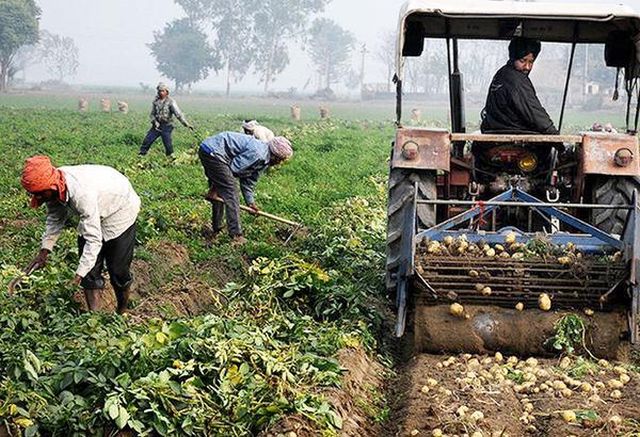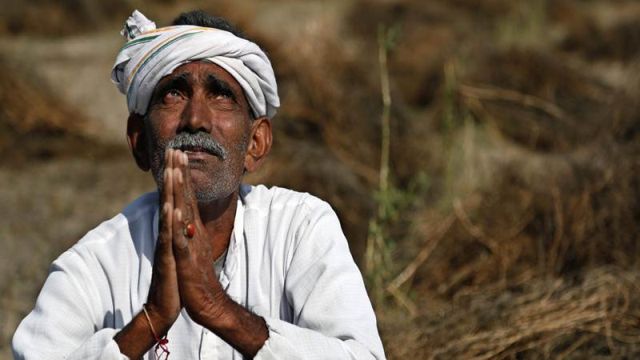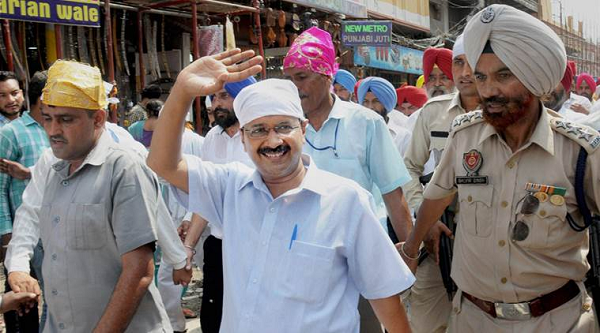
by admin | May 25, 2021 | Economy, Markets, News
 By Saurabh Katkurwar,
By Saurabh Katkurwar,
Jalandhar : Even as a new harvesting season has begun, Punjab’s farmers are staring at bleak prospects with potato prices, that had hit rock-bottom last year, not showing signs of returning to previous levels.
About 10 per cent of the current season’s total harvest has been sold and the prices have stuck somewhere between Rs 150 and Rs 300 per quintal, according to the Punjab Horticulture Department. Farmers are apprehensive about the remuneration this year too, though the production is expected to be higher owing to favourable climatic conditions. About 80 per cent of the harvest in Punjab comes during the peak season of February and March.
Potato prices had slumped to just Rs 10 for a bag of 100 kg (one quintal) last year, leaving farmers in tears — and most of them chose to throw their produce on the roads to rot.
According to the Punjab government, production this year is expected to be over 2.5 million tonnes.
“If the weather is congenial and potato plants are not infected by the blight, overall yield will be good. Currently the rates are not good, I heard,” Gulab Singh Gill, Deputy Director (Horticulture) told IANS.
What concerns the farmers more is uncertainty over remunerative prices for their harvest when it hits the market during the peak season, said Gurinder Singh Kang, a potato grower from Jalandhar’s Lallian Kalan village.
“There is neither much fog nor initiation of blight disease. The climate is quite favorable for optimum output. However, there is an apprehension among farmers and traders whether they will get a fair price as current rates are at below Rs 3 for a kg,” Kang said.
Despite the fall in prices last year, land under potato cultivation has increased this year as farmers used a certain amount of the unsold crop for sowing.
“It is not just the decline in consumption or rise in production that led to the price drop, but several policy-related reasons such as demonetisation, high tax rate for cold storage, lack of export facilities are also responsible,” an official of the Jalandhar Potato Growers Association (JPCA) said.
“It is like multi-organ failure. After demonetisation, traders have become hesitant to procure any agricultural produce in excess. Earlier, we had to pay 14 per cent tax for cold storage but post-GST it has become 28 per cent,” said JPGA Secretary Jagat Gill Thamanwal.
“Also, there are no facilities for exports. Punjab is land-locked and exports to Pakistan are banned via the Wagah border. As the sea route is not cost-effective, our superior potato crop fails in the competition,” Thamanwal added.
Thus, farmers had thrown about 80 per cent of their crop on the roads due to the drastic fall in prices last year.
It is not just the potato growers who have been hurt but the vibrant seed industry has also been significantly impacted, claimed JPCA President Gururaj Nijjar.
“We fulfill almost 33 per cent of the country’s demand and we provide good quality seeds to other states. However, the seeds we produced were not sold this year. We could not even store them in cold storage as the seed’s life is just two months,” Nijjar said.
Potato seeds grown in the Doaba region — the land between the Sutlej and Ravi rivers — are in huge demand across the country for being disease-free and of superior quality.
Nijjar produced 15,000 bags (each 50 kg) of potato seeds in 2016-17 and Gill produced 35,000 bags.
Farmers in the region have sought government assistance, including a minimum support price (MSP), to bring them out of the financial distress.
Including potatoes in the MSP scheme is, however, not possible as it is a cash crop and prices will be decided by the markets, asserted a senior government official, who requested anonymity.
(Saurabh Katkurwar can be contacted at saurabh.k@ians.in )
—IANS

by admin | May 25, 2021 | News, Politics
 (Note Ban Series)
(Note Ban Series)
By Jaideep Sarin,
Chandigarh : The ‘Green Revolution’ state is yet to recover from the after-effects of the note ban decision.
The announcement by the Narendra Modi government was sudden and it could not have come at a worse time for farmers in Punjab and neighbouring Haryana as the paddy procurement season was at its peak and payments of over Rs 20,000 crore were yet to be made to the farming community at that time.
With confusion abounding over the old Rs 1,000 and Rs 500 currency notes, non-availability of the new currency notes, stoppage of operations of cooperative banks and long queues outside bank branches in rural areas, the farm economy got virtually messed up in both the states.
“The Arhtiyas (commission agents) took full advantage of the situation. Most farmers were already reeling under debt and money was not available to pay them back. The payments for procured paddy was delayed and the situation took a turn for the worst,” farmer Baljit Singh, who has his land near Mahilpur in Hoshiarpur district, told IANS.
“It seems the Modi government had no idea of the toll it would take on the poor, debt-ridden farmers in agrarian states like ours. The move was most ill-timed pushing many farmers further into debt. It was an economic anarchy,” he said, expressing the anguish of thousands of affected farmers.
In rural areas of Haryana, long queues were visible three months after the demonetisation announcement was made on November 8 last year, with supply of new currency notes being highly erratic.
“For several weeks, farmers had to suffer, as they could not buy seeds and fertilisers for the next crop on time after the paddy harvest. The government and its agencies did little to help us,” farmer Randeep Singh of Sangrur district told IANS.
Punjab, which has just 1.54 per cent of the country’s geographical area, contributes nearly 50 per cent of the foodgrains to the central kitty.
Farmers say that the sentiment in agriculture and horticulture continues to be down ever since that fateful day.
“The agrarian economy is still reeling under the after-effects of the demonetisation and its cascading effect. The sentiment is still down. The horticulture sector was the worst hit as the citrus fruits like Kinnow were already in the markets and orders were cancelled overnight,” said Amarjit Singh, a horticulturist from the Abohar-Fazilka belt of southwest Punjab.
Youngster Adiraj, who had picked up orders for the supply of Tangerines grown in his family orchard and wanted to market these, suddenly found buyers cancelling orders.
“Fruits and vegetables have a restricted shelf life of 3-7 days. These have to be sold and consumed. As orders were cancelled or payments were stuck, growers suffered. The horticulture sector has still not recovered,” horticulturist Kulwant Singh told IANS.
Taking a jibe at the “dreamy plan” of the Modi government to double the income of farmers in the next few years, farmers say that the agriculture sector has been set back by at least five years due to demonetisation.
“Look at the spate of suicides in Punjab, especially by young farmers who are under debt. Some of them have outstanding loans of less than Rs 5 lakhs but are unable to pay these back and are committing suicide. The central and state governments are only doing lip service and no one is really bothered,” farmer leader Rajwant Singh said.
A majority of farmers in Punjab have small land holdings — from 2.5 to 5 acres — due to which they hardly earn any profit from the crops. Most of them barely sustain themselves and their families.
The Congress government in Punjab, under Chief Minister Amarinder Singh, has promised to waive loans of up to Rs 2 lakh of debt-ridden farmers. This is going to cost the fund-starved government a whopping Rs 9,500 crore.
Till the Centre steps in and both governments take some bold decisions to pull out the agriculture sector from the present mess aggravated by demonetisation, the farm economy will continue to be in doldrums in the food bowl of India.
(Jaideep Sarin can be reached at jaideep.s@ians.in)
—IANS

by admin | May 25, 2021 | News, Politics
 Baghapurana (Punjab), (IANS) : Aiming to target a major vote bank in the state, the Aam Aadmi Party (AAP) on Sunday promised to make farmers in Punjab debt free by end of 2018 if the party was voted to power in assembly elections early next year.
Baghapurana (Punjab), (IANS) : Aiming to target a major vote bank in the state, the Aam Aadmi Party (AAP) on Sunday promised to make farmers in Punjab debt free by end of 2018 if the party was voted to power in assembly elections early next year.
AAP convener and Delhi Chief Minister Arvind Kejriwal, who released the Kisan (farmer) manifesto of AAP in this Punjab town in Moga district, said the party will implement the Swaminathan Panel report on agriculture and ensure that no more farmers in the ‘Green Revolution’ state committed suicide.
Kejriwal was flanked by AAP Punjab convener, comedian-turned-politician Gurpreet Ghuggi, and AAP MPs from Punjab, Bhagwant Mann and Sadhu Singh.
The AAP Kisan manifesto promised to pay a compensation of Rs 20,000 per acre if their crop was damaged due to natural calamity. It promised compensation for farm labourers and said that property of farmers will not be confiscated or attached in default of payment of loans. It also promised 12-hour uninterrupted power supply free of cost to farmers.
Addressing the rally, Kejriwal said that Punjab’s ruling Badal family and the Shiromani Akali Dal, which has been in power in Punjab in an alliance with the Bharatiya Janata Party (BJP) since 2007, had ruined the farmers of the once progressive state.
He said that Akali Dal leaders would be put behind bars and their properties confiscated for indulging in large-scale corruption in Punjab.
The AAP, which has witnessed internal crisis in its Punjab unit in the past one month, is trying to revive itself to pose a challenge to the Akali Dal-BJP alliance and the opposition Congress.
Kejriwal arrived here on Thursday for a four-day political tour to revive the party’s fortunes.



